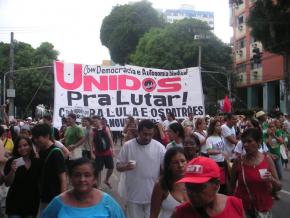The WSF confronts the crisis
reports from Belém, Brazil on the debates that are shaping the World Social Forum.
EIGHT YEARS after it was born in midst of the rebellion against neoliberalism, the World Social Forum (WSF) is playing host to five South American presidents--from Brazil, Venezuela, Bolivia, Ecuador and Paraguay.
Ironically, a rally that featured the presidents was held in a university gymnasium that just a couple of hours earlier had been the scene of a rowdy trade union meeting calling for a new labor federation to challenge the policies of Brazil's President Luis Inacio Lula da Silva, of the Workers Party (PT, after its initials in Portuguese).
With the world economic crisis beginning to hit hard in Brazil, the left-wing Conlutas labor federation called for unity with Intersindical and other militant trade unions that have broken from the moderate CUT labor federation.
The meeting highlighted the contradictions of this year's WSF, as the spirit of struggle that animated the event contrasted with an effort to showcase Lula as the leader of Latin America's left and center-left governments.

In one respect, the participation of heads of state is a sign of just how much has changed in Latin America since the WSF was launched in the Brazilian city of Porto Alegre in 2001.
Conceived as an ideological counterblast to the meeting of politicians and CEOs at the World Economic Forum in Davos, Switzerland, the second WSF in 2002 became a focal point for resistance, coming just weeks after the economic collapse and popular uprising in Argentina that toppled four presidents in two weeks.
The third WSF in 2003 featured a rally with Lula just after his ascension to the presidency--to the joy of participants who looked forward to a break with pro-business, market-oriented governments. Lula's victory was seen as a continuation of the shift to the left in Latin America that began with Hugo Chávez's 1999 election victory in Venezuela.
Since then, popular resistance to neoliberalism has forced out conservative governments across the region, bringing into office Evo Morales in Bolivia, Rafael Correa in Ecuador and Fernando Lugo in Paraguay. (Three other heads of state often included in this so-called "pink tide"--Michelle Bachelet in Chile, Christina Kirchner in Argentina and Tabaré Vazquez in Uruguay--are, in fact, much more moderate).
In Brazil, however, the far left has moved into opposition to Lula's center-left government. While he has carried out some populist measures, such as aid to the poor, Lula has continued the main neoliberal policies of his predecessors and staked out a role as a sub-imperial power, tied closely the U.S., highlighted by the Brazilian-led occupation of Haiti.
THE WSF is increasingly connected to the Brazilian political establishment. This year's forum is being held in Belém, the principal city of the Amazon region, with the support of Ana Júlia Carepa, the PT governor in the state of Pará.
What was once a broad alliance of left-wing parties, labor unions, social movements and non-governmental organizations (NGOs) has fragmented. Of the nearly 2,000 meetings at the event, the majority are devoted to specific NGO projects and individual issues, rather than the world economic crisis.
Certainly, the WSF still plays an important role as a gathering place for the left and beyond. One advantage to holding the event in Belém is that it highlights the struggles of the indigenous movements of the pan-Amazonian region, which remain some of the most vital social movements in Latin America.
The first full day of the WSF, January 28, was largely devoted to presentations by indigenous social activists. And given the scale of the world crisis, even moderate trade union leaders felt compelled to give speeches calling for government action to ameliorate its impact on workers.
Moreover, the far left remains vocal and visible. One of the first big meetings at the WSF featured Heloisa Helena, the former presidential candidate of the Party of Socialism and Liberation (PSOL), who got 7 percent of the vote--6.5 million people--against Lula in the 2007 elections. Helena gave a typically rousing speech to a meeting of 400 people, calling on workers and activists to resist attempts by employers to make them pay for the economic crisis.
In other meetings, organizations such as the Belgian-based Committee to Abolish Third World Debt, carried on the arguments that were dominant at the early WSF events: opposition to the International Monetary Fund, World Bank and World Trade Organization, and the need to put forward an anti-capitalist perspective for the social movements.
Elsewhere, left-wing currents were able to use the forum to organize internationally on key issues. A meeting sponsored by the Latin American academic network CLACSO on the impact of neoliberalism in education, for example, discussed issues that would have been familiar to any U.S. teacher. And in a series of meetings organized by socialist organizations, activists debated the dimensions of the capitalist crisis and its political implications.
At a meeting sponsored by the Enlaces grouping of PSOL, the Argentine Marxist economist Claudio Katz stressed the profound character of the crisis. "The social movements must discuss an anti-capitalist strategy," he said, and argued that socialism is the only "program for the liberation of humanity."
As the WSF reached its halfway point, left-wing groups on the ruling International Council were strategizing on how to put forward a militant program in the WSF's traditional closing statement. Whether or not they can achieve this, the left has already succeeded in opening up the debate at a critical moment.


